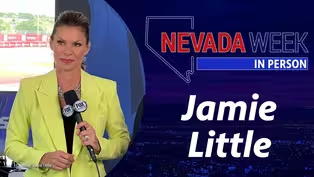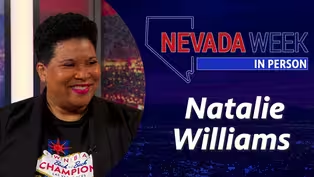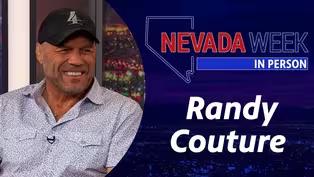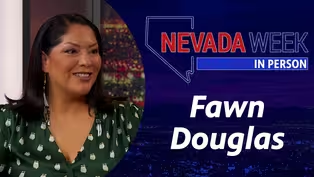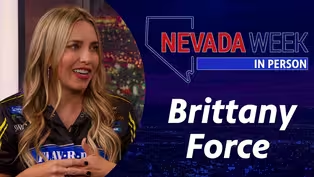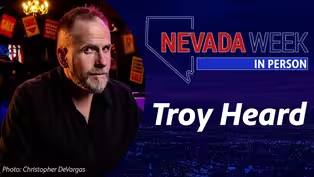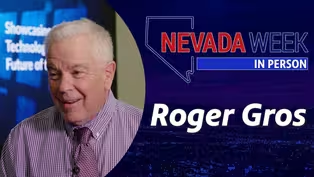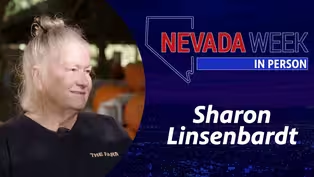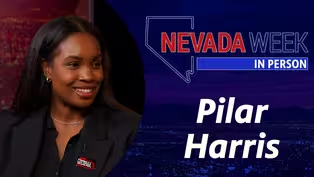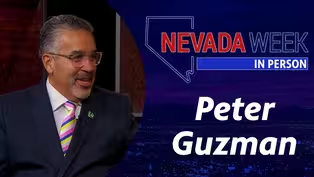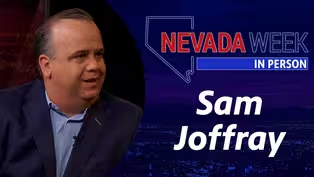
Nevada Week In Person | Tennille Pereira
Season 1 Episode 83 | 14mVideo has Closed Captions
One-on-one interview with Tennille Pereira, Director, Vegas Strong Resiliency Center
One-on-one interview with Tennille Pereira, Director, Vegas Strong Resiliency Center
Problems playing video? | Closed Captioning Feedback
Problems playing video? | Closed Captioning Feedback
Nevada Week In Person is a local public television program presented by Vegas PBS

Nevada Week In Person | Tennille Pereira
Season 1 Episode 83 | 14mVideo has Closed Captions
One-on-one interview with Tennille Pereira, Director, Vegas Strong Resiliency Center
Problems playing video? | Closed Captioning Feedback
How to Watch Nevada Week In Person
Nevada Week In Person is available to stream on pbs.org and the free PBS App, available on iPhone, Apple TV, Android TV, Android smartphones, Amazon Fire TV, Amazon Fire Tablet, Roku, Samsung Smart TV, and Vizio.
Providing Support for PBS.org
Learn Moreabout PBS online sponsorshipMore from This Collection
Nevada Week In Person goes beyond the roundtable discussion of Nevada Week with guests for a more casual conversation about their personal passions, new projects and compelling stories that are overlooked in the flurry of the news cycle.
Nevada Week In Person | Jamie Little
Video has Closed Captions
One-on-one interview with Jamie Little, NASCAR Broadcaster (14m)
Nevada Week In Person | Chet Buchanan
Video has Closed Captions
One-on-one interview with Chet Buchanan,Host & Creator, 98.5 KLUC’s The Chet Buchanan Show (14m)
Nevada Week In Person | Natalie Williams
Video has Closed Captions
One-on-one interview with Natalie Williams, General Manager, Las Vegas Aces (14m)
Nevada Week In Person | Randy Couture
Video has Closed Captions
One-on-one interview with Randy Couture, UFC Hall of Famer & U.S. Army Veteran (14m)
Nevada Week In Person | Fawn Douglas
Video has Closed Captions
One-on-one interview with Fawn Douglas, Artist and Activist, Nuwu Art (14m)
Nevada Week In Person | Brittany Force
Video has Closed Captions
One-on-one interview with Brittany Force, World Champion Drag Racer (14m)
Nevada Week In Person | Troy Heard
Video has Closed Captions
One-on-one interview with Troy Heard, Artistic Director, Majestic Repertory Theatre (14m)
Nevada Week In Person | Roger Gros
Video has Closed Captions
One-on-one interview with Roger Gros, Publisher, Global Gaming Business Magazine (14m)
Video has Closed Captions
One-on-one interview with Sharon Linsenbardt, Owner, Las Vegas Farm and Barn Buddies Rescu (14m)
Nevada Week In Person | Pilar Harris
Video has Closed Captions
One-on-one interview with Pilar Harris (14m)
Nevada Week In Person | Peter Guzman
Video has Closed Captions
One-on-one interview with Latin Chamber of Commerce Nevada President & CEO Peter Guzman (14m)
Nevada Week In Person | Sam Joffray
Video has Closed Captions
One-on-one interview with Sam Joffray, President & CEO, Las Vegas Super Bowl LVII Host Com (14m)
Providing Support for PBS.org
Learn Moreabout PBS online sponsorshipAn advocate, attorney, and director of the Vegas Strong Resiliency Center, Tennille Pereira is our guest this week on Nevada Week In Person.
♪♪ Support for Nevada Week In Person is provided by Senator William H. Hernstadt.
Welcome to Nevada Week In Person.
I'm Amber Renee Dixon.
A consumer rights attorney in the aftermath of the 1 October shooting, she offered free legal help to victims and their family members.
Now the Director of the Vegas Strong Resiliency Center, Tennille Pereira, thank you for joining Nevada Week In Person.
(Tennille Pereira) No problem.
Thanks for having me.
-So let's go through this journey of what led you to the Vegas Strong Resiliency Center.
Six years ago prior to the mass shooting, what kind of cases were you working, and how did 1 October change that?
-Consumer litigation.
I was working a lot of payday loans and predatory lending with the Legal Aid Center of Southern Nevada.
-And how did 1 October change everything you were doing?
-It changed everything.
It took me off the trajectory that I was on and switched me over to, you know, victims' rights type of work.
So I volunteered to help at the Family Assistance Center providing legal services.
-And that was-- the Family Assistance Center was what prior to the Vegas Strong Resiliency?
-So it was like its predecessor.
It was the first three weeks of the response and recovery to help everyone that was impacted.
-Okay.
So this changes your trajectory, as you put it.
Do you think it was meant to be?
When you look back, why were you the person for this role?
-I do.
I mean, I don't believe in coincidence.
And I believe that I had been prepared and put in that exact spot when I was there.
-So the Family Assistance Center turned into the Vegas Strong Resiliency Center.
Prior to that you were working for Legal Aid of Southern Nevada, correct?
And I want to make sure that we get this story in, because how did you first become aware of the Legal Aid of Southern Nevada?
-So I volunteered as a CASA, and I got a case of four children.
And I ended up meeting the attorney that was representing those children.
But I ended up adopting them.
And I fell in love with the Legal Aid and the work that they do in the community.
And so I also got a job with them at the same time.
-Is Legal Aid who helped you with the adoption process?
-They did.
They did.
-So you have how many children in total?
-I have six children, yeah.
-Two biological-- -Mm-hmm.
- --four adopted children.
What is life like?
-It's a little crazy some days, but it's a beautiful crazy, I guess.
-What would you say to someone who's considering adoption?
-To do it.
Don't get too in the weeds.
Don't overthink it.
It is a lot of work, but it is amazing.
Yeah.
-What might people tend to overthink about it?
-Worry about how is it going to work out?
What about this?
What about that?
You know, I feel like any family, you figure it out.
-How do you think it's impacted you as a person to be the mother of four adopted children?
-It has opened my eyes.
They were in foster care, and so they had dealt with a lot of trauma.
And it was the work with them understanding trauma that really helped me do the work that I do now with 1 October.
Yeah, you're just-- your eyes are opened.
-So you would hear their stories from them.
And how did that prepare you for your role now, do you think?
-Because the way trauma impacts the brain, it impacts the way people think, the way they process, the way they react to many things.
Parenting my two oldest was completely different than parenting my adopted, because they reacted differently.
And they would do things.
It's like, why would they do that?
And learning how trauma impacted them helped me understand them.
So now when I'm working with victims of violent crime, survivors of, you know, 1 October, when they kind of lash out at me or, you know, they're frustrated, I understand why they're feeling that way.
And I can, you know, tailor my services to that.
-That's something you experience, people lashing out at you.
Why would they be upset with you?
-Well, they're upset with the situation they're in.
These circumstances that they are now faced with are so unfair.
Right?
And so they're angry.
And a lot of times, it comes out on whoever is in front of them.
And so, you know, I can understand why they're angry and why they're frustrated.
And I don't take it personally.
I just stay there with them and can talk them through that: I understand why you're angry, and I would be angry too.
-Well, certainly unfair that they were at the shooting at the time.
But then what are the repercussions that end up being unfair as well that people may not realize?
-They have to live with the trauma for the rest of their lives.
A lot of people will tell them, well, why can't you get over it?
It's been six years.
But you don't get over trauma like that.
You have to find a new normal.
Like you have to walk through it, and it's a lot of hard work.
-When you were providing the legal services to these victims, what kind of legal services?
-So they have evolved over time.
So in the very beginning, we saw a lot of employment issues.
People, you know-- the barbacks, the people that were there didn't get paid what they were supposed to.
-The people working the bar at the concert?
-Right.
-Wow!
-People wanted their money back.
They paid a lot of money to be at this concert.
So getting people refunds.
People would then go back to work, and they would find they weren't able to do the same work.
So it was a lot of different things.
Foreclosures, rental issues.
You know, when you're dealing with trauma like that, it kind of puts your life in upheaval.
And there's so many legal issues that fallout from that.
Insurance issues.
You know, we had one gentleman who his truck had gotten shot up.
He was transporting people to the hospital.
There was, you know, blood in the truck.
We got the insurance to cover it, because they had originally denied it.
-Wow!
-We got an Uber driver a new car seat.
You know, just a lot of different things that you wouldn't necessarily think of.
-An Uber driver a new car seat?
-Yeah, because he had transported injured people in the back of his car, and they wouldn't pay for a new car seat.
So we found him other benefits that he got denied for, but we got them approved.
So a lot of like Victims of Crime Program benefits.
-Wow!
-Yeah.
-What are the legal services that you're providing now?
How have they changed?
-So we're still working through benefits.
-Okay.
-So Victims of Crime benefits, as well as like disability benefits, getting people accommodations with their employers, and also helping them kind of restructure things financially.
If they're dealing with a less, a lower income, how can we work with them on that.
We've seen, sadly, divorces, custody.
All sorts of family dynamics have changed.
-Wow!
That are a result of this tragedy and the trauma that it caused?
-Right.
-I wonder about your own mental health in hearing all these stories and litigating on behalf of these victims.
How do you take care of yourself?
-I have to be mindful of how I'm feeling.
Again, that understanding trauma, secondary trauma, vicarious trauma; taking care of, you know, my staff, watching how they react.
You know, every year at the year mark, you can see tensions are a little bit higher.
A lot of it is being aware and then say, okay, where is my limit, you know?
When do I need to kind of step back?
Talking to people.
Telling my husband.
Telling my family, you know, I'm feeling some pressure today, and I need to just go in my room and close my door.
You know, just being really aware of, you know, your own feelings.
-Wow!
I also wonder about your background in the Navy.
You are a Navy veteran.
You served a tour or more than one tour?
-I did two, two deployments.
I was in a total of 10 years, and I did two deployments.
Spent quite a bit of time on a ship, about 3 1/2, 4 years on a ship.
-And where was that?
-So it was stationed in San Diego.
But when we were deployed, we would get deployed over to the Middle East.
-Okay.
And how did that experience mold you into who you are today?
-So I think, you know, it gave me a lot of strength, understanding I can do hard things.
You know, being in a place where tensions are very high, emotions run very high, it's very stressful.
Just knowing that I-- that I can do that, that I can-- I'm very team oriented.
And I think it comes from that.
That camaraderie that you feel when you're in the military is really important.
-Tell me more about how you became-- you describe yourself as an advocate in a lot of interviews that I've listened to.
At what point in your life did you decide that is the role I would like to fulfill?
-I think it's just part of my personality.
When I see someone suffering or someone being taken advantage of, I have to speak up.
I have to say something.
When I was in school growing up, that was not always good.
I was always getting in trouble for it.
But I've learned, as an adult, it really is a useful skill.
-I'm sure that you've gotten pushback through your life for it, though.
-Yep.
-And how do you confront that?
-It's okay.
It's about learning how to communicate, right?
When I was younger, it would, you know, be out of anger and maybe not the best way.
And now I've learned that collaboration is very important and how to collaborate and not force your will.
-Okay.
Can you give me an example, I wonder.
-Yes.
-Okay.
-The 1 October Memorial Committee, I was asked to be on the committee, and I was the chair.
And that was a very emotional process.
We brought people from very different backgrounds and perspectives.
But each one of them, that was their piece in bringing to the table, and so we had to kind of meld those together to get the best outcome.
But sometimes, you know, in my mind, I'd be like, no, that's, that's not it.
But that's my personal opinion.
So I had to take myself out of it and really work to kind of bridge all of those different perspectives for the ultimate collaborative effort.
-And you said, "I was the chairperson," because that committee has recently been dissolved because you reached a design, which we talked about on a recent episode of Nevada Week.
Personally, that took four years of work, I believe?
-Mm-hmm.
-What does it mean to you to have that--I don't know if this is the right way to say it--behind you?
To have that-- because it's not constructed yet, but great to have the design set.
-It's bittersweet.
Like, it's something that I'm, I'm really proud of.
I could not be happier with the results.
I've seen a lot of healing in the community as a result.
So, you know, there's a soft spot in my heart for that project.
But also, you know, bittersweet because I won't be sitting with those members of the committee every month anymore.
I won't be, you know, working through that.
I felt very connected to the community as we did it.
But, you know, we met our goal.
And that was really important.
-How can a memorial bring healing?
-Working through that process.
So we did a lot of community engagement.
That was very important to us.
And we put the healing process before the actual end product.
You know, the end product is important, but it was really about healing for us.
So we had to do the community engagement so that people had a voice.
And it gave them a voice, and it validated their experiences.
It validated what they went through, their, the losses, but also, you know, the, the light that's come out of 1 October.
-Tennille Pereira, Director of the Vegas Strong Resiliency Center, thank you for joining Nevada Week In Person.
And thank you for watching.
To see more interviews like this, go to vegaspbs.org/nevadaweek.
♪♪

- News and Public Affairs

Top journalists deliver compelling original analysis of the hour's headlines.

- News and Public Affairs

FRONTLINE is investigative journalism that questions, explains and changes our world.












Support for PBS provided by:
Nevada Week In Person is a local public television program presented by Vegas PBS
